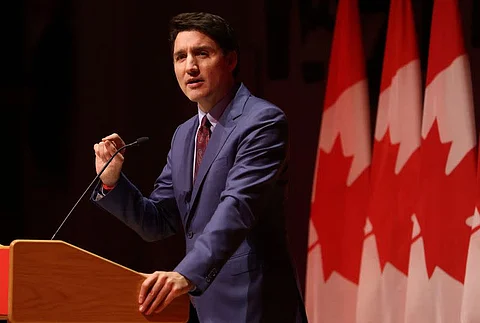

Prime Minister Justin Trudeau of Canada is navigating a growing political crisis that could lead to his resignation. Isolated within his own Liberal Party, Trudeau has been accused of leveraging allegations against India to divert attention from domestic challenges, including a faltering economy and internal party discord.
Dissent within the Liberal Party
Over the past year, Trudeau's leadership has been openly questioned by several prominent Liberal MPs, such as Sean Casey and Ken McDonald, who have urged him to step down. Reports indicate that over 20 MPs from his party have signed a document calling for his resignation, reflecting deep dissatisfaction with his leadership style and decision-making.
The departure of Chrystia Freeland as Deputy Prime Minister and Finance Minister in December further weakened Trudeau’s government. Freeland’s exit was reportedly prompted by disagreements over key policies, including Trudeau’s response to potential U.S. tariffs and his broader economic approach. In her resignation letter, Freeland criticized Trudeau’s reliance on "expensive political stunts," signaling her frustration with his leadership direction.
Leadership Under Fire
Trudeau attempted to downplay the growing discord within his party by comparing it to family disputes during the holiday season. “Like any family, we sometimes have disagreements around the holidays,” Trudeau said in December. “But, like families do, we find a way through them. I love this party, this country, and all of you.”
However, Freeland’s sharp critique and departure painted a starkly different picture. Following her resignation, Trudeau retreated from the public eye, reducing his appearances at media events and spending significant time at a ski resort—an action that drew further criticism during a critical period for his leadership.
A Shaky Future
As pressure mounts on Trudeau, the Liberal Party faces a critical challenge: finding a leader who can unify the party and address Canada’s pressing economic and political issues. Whether Trudeau steps aside or fights to remain in power, his leadership struggles have placed the Liberal Party and Canadian politics at a crossroads.
Adding to the growing internal discord, the Liberal Party recently faced setbacks in two crucial by-elections, further complicating Prime Minister Justin Trudeau’s political troubles.
Key allies, such as New Democratic Party (NDP) leader Jagmeet Singh, have escalated the pressure on Trudeau’s government. Singh has announced plans to introduce a no-confidence motion in Parliament, aiming to bring down the administration. With Parliament currently on its winter break, proceedings are set to resume on January 27, placing Trudeau’s leadership under a ticking clock.
Should Trudeau resign, the Liberal Party faces a significant challenge in identifying a leader with widespread appeal. Canadian political rules prevent an interim leader from running for the party’s permanent leadership, adding another layer of complexity. Names like Dominic LeBlanc, Melanie Joly, Francois-Philippe Champagne, and Mark Carney have emerged as potential candidates, but organizing a leadership contest would take months, leaving the party vulnerable.
The process to elect a permanent leader involves a special convention, which could delay preparations for the federal election later this year. If elections are called before a new leader is in place, the Liberals risk losing significant ground to the opposition.
Meanwhile, the opposition Conservative Party, under the leadership of Pierre Poilievre, has surged ahead in public opinion polls. Poilievre has capitalized on public frustration over economic issues, promising to repeal Trudeau’s carbon tax and tackle Canada’s housing crisis. Some polls suggest the Conservatives hold a double-digit lead over the Liberals, further threatening the party’s future.
The already strained relations between Canada and India worsened following Trudeau’s allegations in September 2023, accusing India of involvement in the killing of Khalistani terrorist Hardeep Singh Nijjar. Nijjar, a designated terrorist by India’s National Investigation Agency (NIA), was shot outside a Sikh temple in Canada. While Trudeau’s claims were dismissed as “absurd” by India, the controversy drew criticism both at home and abroad.
In retaliation, India expelled six Canadian diplomats and recalled its ambassador to Ottawa after Canada attempted to question Indian officials in connection with the Nijjar case. Pro-Khalistan activities in Canada, including an attack on a Hindu temple near Toronto, have further fueled tensions.
India has consistently denied any involvement in Nijjar’s death and accused the Trudeau government of pandering to Khalistani sympathizers for political gain. Despite exchanges at international forums like the G20 Summit, Canada has yet to present conclusive evidence linking India to the incident.
As Trudeau’s political challenges intensify, his government finds itself on shaky ground. Internal dissent, opposition momentum, and strained international relations have created a perfect storm, leaving the Liberal Party at a crossroads ahead of the upcoming elections.
